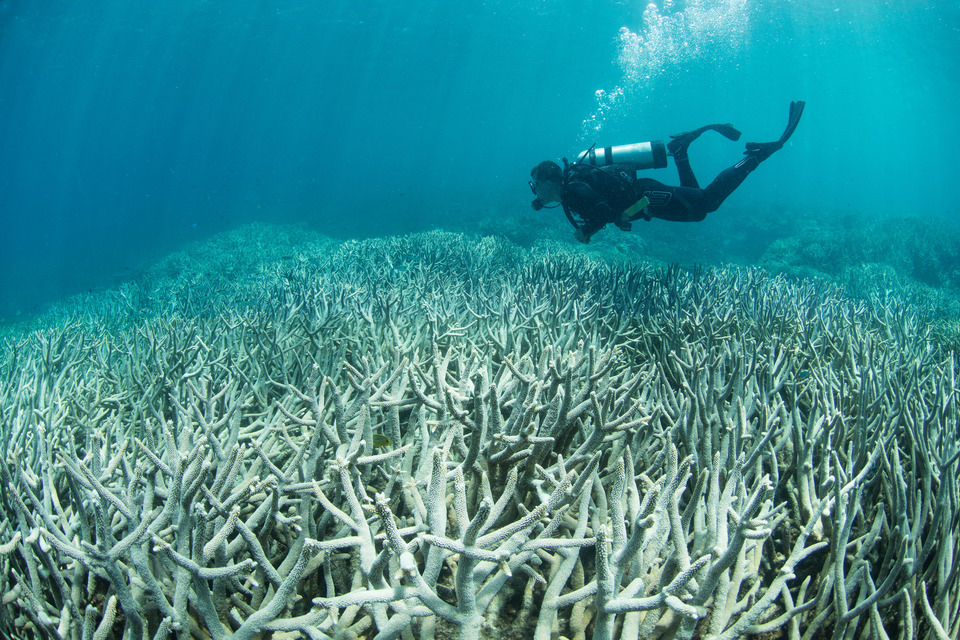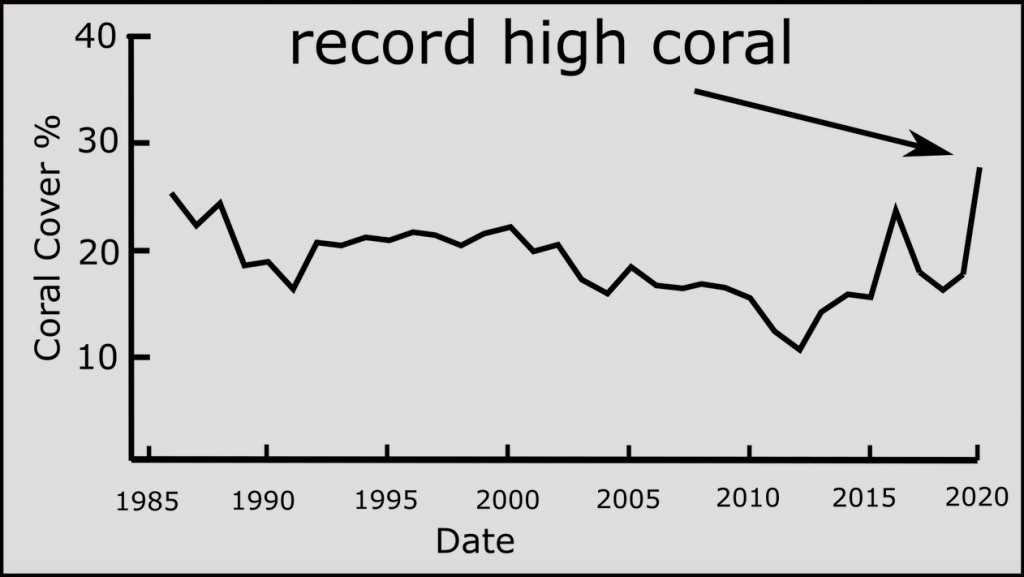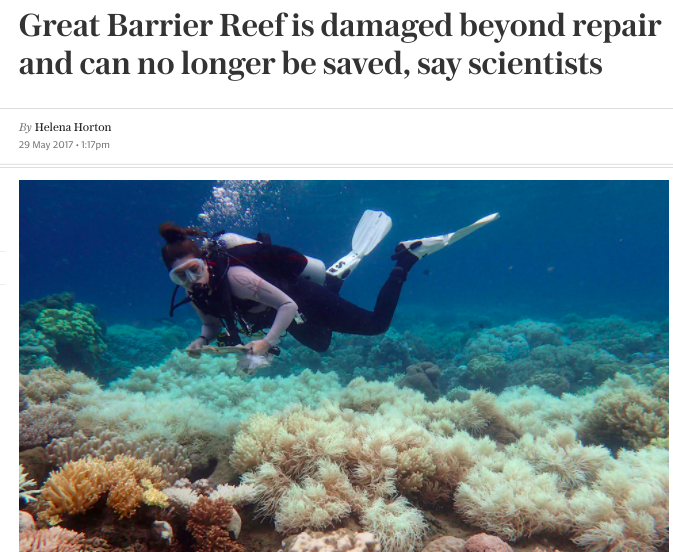
Former JCU Marine Physicist Peter Ridd says the Great Barrier Reef is now experiencing “record high coral cover,” and adds: “We’ve got more coral on the Great Barrier Reef now than we did when records began in 1985.
“We’ve got twice as much coral as we had after huge cyclones went through the reef in about 2011 and 2012, and this record-high coral cover is despite supposedly having three catastrophic unprecedented bleaching events in just the last five years.
“So you’ve just got to wonder were those bleaching events maybe as catastrophic as these experts supposedly claimed.”
The Great Barrier Reef has record high coral cover
The annual data on coral cover for the Great Barrier Reef, produced by the Australian Institute of Marine Science shows that the amount of coral on the reef is at record high levels. Record high, despite all the doom stories by our reef science and management institutions.
Like all other data on the reef, this shows it is in robust health. For example, coral growth rates have, if anything, increased over the past 100 years and measurements of farm pesticides reaching the reef show levels so low that they cannot be detected with the most ultra-sensitive equipment.

This data is good news. It could hardly be better. But somehow, our science organisations have convinced the world that the reef is on its last legs.
How has this happened?
One reason is that occasionally colossal amounts of coral are killed, mostly by cyclones, but also by crown of thorns starfish and bleaching. So the media, with its predilection for bad news, can be fed a regular diet of doom. Our scientists are always happy to oblige. The quiet recovery is generally downplayed or ignored.
Growing up in Innisfail, adjacent to the reef, in the early 1970s, I recall the initial doom stories about the reef.
The scientific study of the reef had only just started, and plagues of starfish that eat the coral had just been discovered and were making headlines worldwide. The reef had, supposedly, only a decade left.
It was reasonable in the ’70s to be concerned about these plagues and they ultimately precipitated AIMS’s long-term monitoring of coral and starfish in the ’80s. I was working at AIMS when this important work started, and it is interesting to look back on what has changed. The coral cover is no less, the number of starfish is no more, but the number of scientists and managers working on the reef has exploded. Perhaps this is the problem.
In 50 years we have now learnt a great deal about the cycles of coral death and regrowth. The data reported every year by AIMS shows all areas go through these cycles every decade or two.
Remarkably, even the excellent news of record coral still has the scientists pessimistic. The reef is, apparently, still doomed from climate change and this is just a temporary reprieve.
How good does the data need to be to make them admit the reef is fine?
The science institutions have been claiming that there have been three disastrous bleaching events in the past five years, which does not accord with the latest statistics.
Record coral cover means there was no disaster on the reef. The only disaster is the quality assurance at the science organisations.
An examination of the data shows that, while there have been three events, they occurred in largely different regions in each year. The reef has thus effectively had one major bleaching event in the past five years and the previous major event was in 2002. So the reef has had roughly one event in 15 years, and most of the coral on the reef did not bleach, and most that bleached did not die. Therefore, it is not surprising that the reef is in good shape.
The science institutions have been caught out by their own deception. They exaggerated the bleaching events – as usual. Luckily, we have the AIMS long-term coral monitoring surveys, which are done professionally with good-quality protocols, to demonstrate the state of the reef.
The bad news is that the record high coral cover means it is likely that coral cover will decline in the next few years. Prepare for the headlines saying the reef has lost much of its coral and is indicative of climate change and farmers polluting the reef. And the reef will be predicted to be gone by 2050 – or whenever.
When will these doom stories about the reef, which have been going for 50 years, cease?
Will it be like the Ancient Greek legend of Prometheus, who was chained alive to a rock so that his liver could be eaten by an eagle, only for the liver to grow overnight so that it could be eaten again and again? Will the agony ever end?
According to legend, Heracles saved Prometheus. Who will be our Heracles, and support better quality assurance of the science?
It should be the Great Barrier Reef Marine Park Authority, but so far it has not been interested. The various ministers could also take an interest.
In the meantime, don’t forget we have record high levels of coral. It is time to stop scaring the children with doom stories about the reef.
Peter Ridd has researched the Great Barrier Reef for decades and is the author of Reef Heresy Science, Research and the Great Barrier Reef, published by Connor Court. [The GWPF, AIMS gov, Sky News]
Recently, a M9.5 earthquake was removed from all seismic maps and quake alerts around the world… Another data manipulation?
Now subscribe to this blog to get more amazing news curated just for you right in your inbox on a daily basis (here an example of our new newsletter).
You can also follow us on Facebook and/ or Twitter. And, by the way you can also make a donation through Paypal. Thank you!
You should really subscribe to QFiles. You will get very interesting information about strange events around the world.














The did restrict travel along most sections of the barrier reef, allowing only a small channel for cargo ships and passenger boats. I believe this would had helped it greatly also by banning fishing or anchoring around those restricted areas.
Hey, if climate change is good for the coral, it must be fantastic for the rest of the world.
Nature will always compensate for its balance. The enviro peeps know this. They are pawns. Many are paid to push their agenda while selling out humanity. Most politicians do the same, via bribery or blackmail. That’s the way I see it.
Anyone else remember when Jaques Cousteau was peddling the coral reef apocalypse? They had the Cousteau Society tv commercial of a healthy reef, and a diseased reef in 20 years propaganda.
Jaques was still a good scuba guy and his work was interesting, but they got him to be a pitch man, like they do with other lefties. Greta too.
*Note to lefties:
We aren’t buying your horseshjt anymore. Take your booster shots and GFY!
https://www.naturalnews.com/2021-09-27-leftist-doctor-says-government-should-go-after-antiscience-independent-media.html
CNN bowtie wearing pervert posing as an expert. Everytime I see some clown in a bowtie, I automatically classify them as some type of weirdo.
It’s a tell. Bill Nye (fake expert) is another bowtie pervert. Peewee Herman, another jackoff bastard. Lol
LOL! Nye the fake science guy isn’t even a scientist. To Hollywood, he looked like one so they use him like one.
https://www.thegatewaypundit.com/2021/09/lt-col-scheller-incarcerated-sent-brig-speaking-loser-us-generals-surrendering-afghanistan-stranding-americans-arming-taliban-terrorists/
This is asinine. This guy should get a medal. We have a commieretard problem.
https://www.thegatewaypundit.com/2021/09/update-federal-judges-say-nyc-can-impose-vaccine-mandate-school-employees-lawyers-representing-teachers-petition-us-supreme-court/
More expert retards making decisions they are unqualified to make.
SCOTUS is a joke too. Here comes more satanic tyranny.
The topic of secession should be discussed by state leaders. We need a divorce from people that want to commit National suicide.